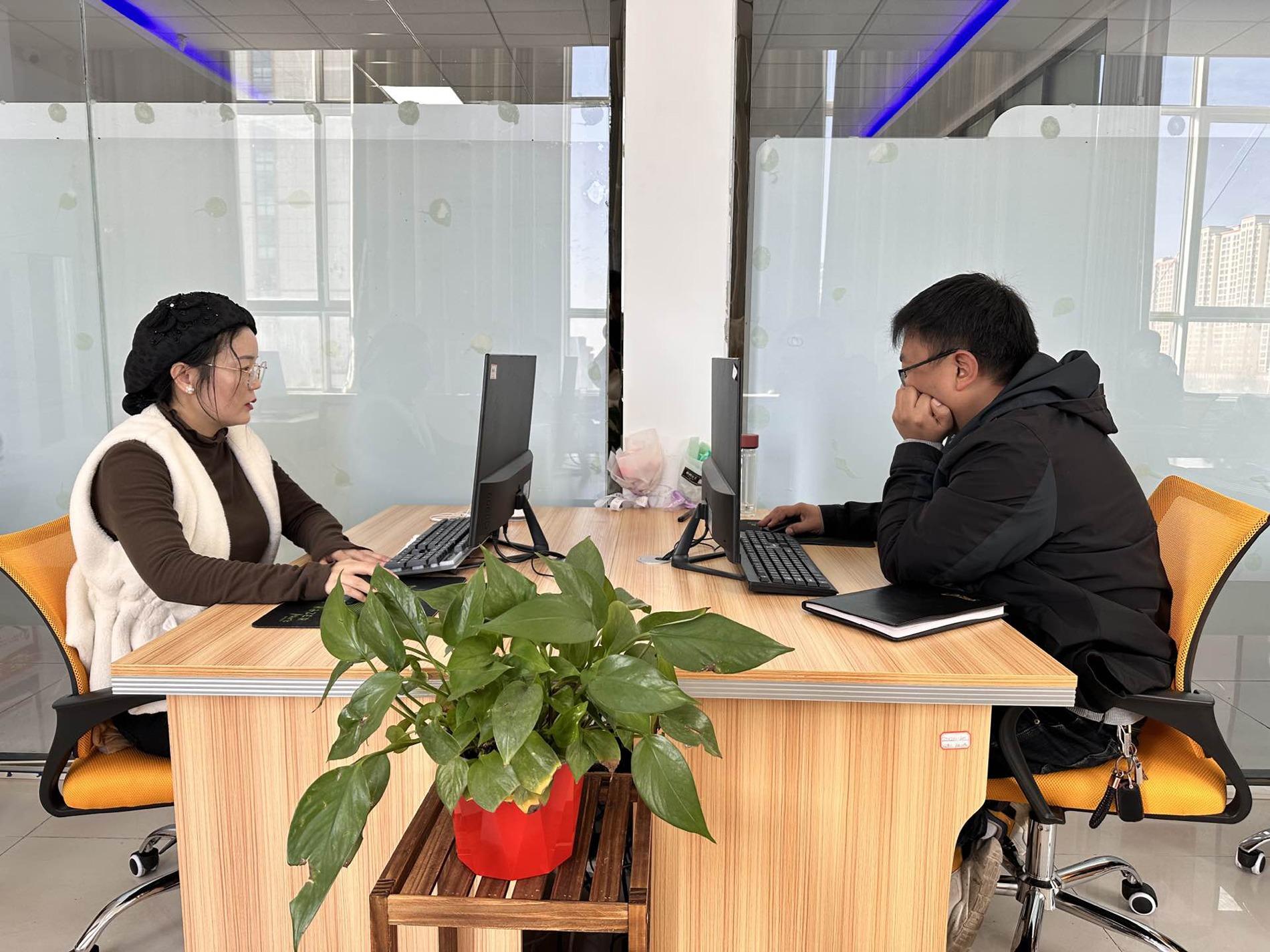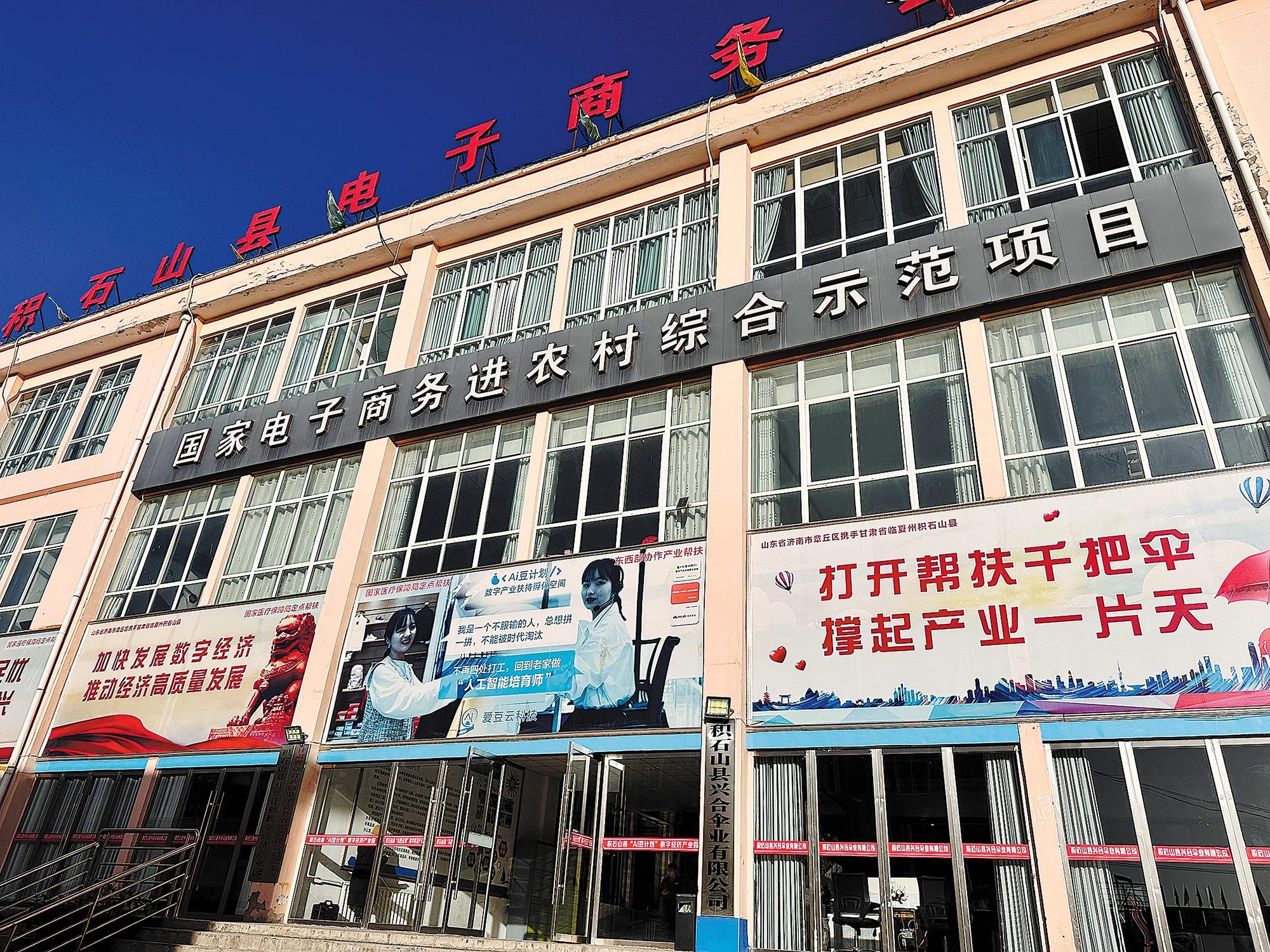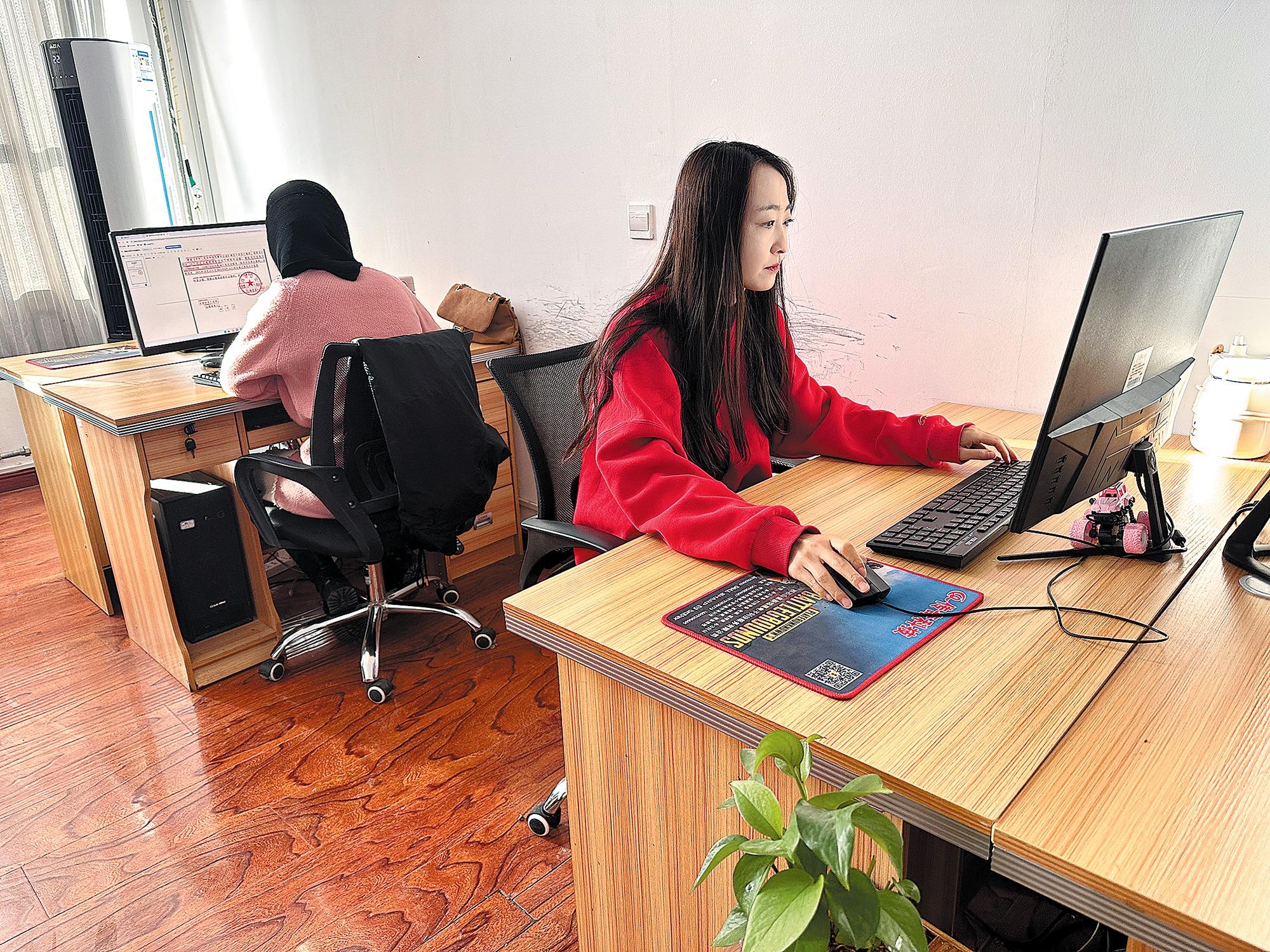Working as trainers for artificial intelligence systems gives women financial independence. Yan Dongjie and Ma Jingna report from Linxia, Gansu.
 Zhang Juan (center) and other AI trainers from Jishishan Bonan, Dongxiang and Salar autonomous county in Gansu province take part in the World Artificial Intelligence Conference in Shanghai last year. (PROVIDED TO CHINA DAILY)
Zhang Juan (center) and other AI trainers from Jishishan Bonan, Dongxiang and Salar autonomous county in Gansu province take part in the World Artificial Intelligence Conference in Shanghai last year. (PROVIDED TO CHINA DAILY)
The buzz around artificial intelligence, Chat GPT and large-scale AI models saw the phrases gain recognition from dictionaries, magazines and publishers around the world last year.
In China, Chat GPT was chosen as the International Word of the Year by Commercial Press, the country's oldest publishing agency, and Yao Wen Jiao Zi, a Shanghai literary magazine, included large-scale AI model in its top 10 popular phrases for 2023.
A large-scale AI model is a machine learning system with billions of parameters and computational resources that can handle massive amounts of data and accomplish complex tasks such as natural language processing and image recognition.
But at the most fundamental level, the high-tech wizardry depends on people feeding information into the system, and that has helped change the lives of some women living in a remote county in northwestern China's Gansu province.
Two years ago, Zhang Juan left Lanzhou, the provincial capital, to return to Jishishan Bonan, Dongxiang and Salar autonomous county, where she grew up, to begin working as an AI trainer at its AIdol Plan Digital Industrial Park. An AI trainer is a person who specializes in data annotation and the training of AI systems — the most fundamental part of the vast AI industry.
The county, in Linxia Hui autonomous prefecture in the southwestern part of Gansu, was struck by a 6.2 magnitude earthquake in December that killed more than 100 people and injured many more. Coverage of the rescue and recovery efforts touched the hearts of people across the country.
It was the first time many of them had heard of Jishishan, which has no train station or airport and is a three-hour drive from Lanzhou.
The industrial park sustained little damage during the earthquake and has now resumed operations.
Zhang never expected to develop a close connection with AI, or that it would change her family's life for the better.
In 2019, Ant Foundation, the Ant Public Welfare Foundation, and the China Women's Development Foundation jointly launched the AIdol Plan to support the employment of women in underdeveloped parts of central and western China.
Wang Zhumei, an Ant Foundation staff member, said the project has established about 20 digital employment centers in places including Jishishan, Qingjian in Shaanxi province, Tongren in Guizhou province, and Shuozhou in Shanxi province.
She said the AIdol Plan has helped more than 4,000 people find local employment, and some of its employment centers have become the largest employers in their areas. Thousands of women have been able to step out of their households and achieve economic independence through the initiative.
 Ma Lei (Left) works as an AI trainer in the AIdol Plan Digital Industrial Park in Jishishan in Gansu 2023. (YAN DONGJIE / CHINA DAILY)
Ma Lei (Left) works as an AI trainer in the AIdol Plan Digital Industrial Park in Jishishan in Gansu 2023. (YAN DONGJIE / CHINA DAILY)
An important part of Zhang's AI job is document recognition.
"When the system misidentifies a handwritten signature while recognizing files uploaded by users, I need to highlight the incorrect signature and key in the corresponding correct characters," she said. "Through repeated iterations, possibly thousands or tens of thousands of times, the system's ability to recognize various styles of handwritten Chinese characters will become stronger."
Zhang said the principles were similar when dealing with text, images or videos.
Her father died when she was in school, and Zhang and her three younger siblings depended on their mother's monthly income of 2,000 to 3,000 yuan as a migrant worker when they were growing up.
In 2019, after graduating from university, Zhang became a surveyor in Lanzhou and the main pillar of support for her family.
"My first project was in Longnan, where I had to draw houses, cars and mountains from aerial images onto a flat map," she said. "Sometimes I had to take a bus for a long time, go to rural areas or mountains for field surveys, and stay overnight. My colleagues were all male, so it was quite challenging."
 An e-commerce center built in the AIdol Plan Industrial Park serves as a workplace for AI trainers in Jishishan. (YAN DONGJIE / CHINA DAILY)
An e-commerce center built in the AIdol Plan Industrial Park serves as a workplace for AI trainers in Jishishan. (YAN DONGJIE / CHINA DAILY)
Like many engineering jobs, Zhang said being a surveyor was not a particularly welcoming occupation for a woman. One time, she was experiencing severe abdominal pain but could not let it hinder her fieldwork. She climbed a high mountain with several male colleagues and, despite being exhausted, persevered so that she would not slow them down.
"With a monthly salary of around 3,000 yuan ($420), it was not enough to sustain myself considering the cost of renting a place and living expenses, let alone supporting my family," she said.
Another consideration that led to her decision to return to Jishishan was that her mother was growing older and it would be good to be closer to her.
"My mother is nearly 50 years old and illiterate," she said. "She hasn't had much education and could only do manual labor, such as picking cotton for a cotton factory in Xinjiang or working as a waitress in a restaurant."
Now, as the main pillar of her family and living closer to it, Zhang said she feels "empowered and valuable". After paying rent and personal expenses in the county seat each month, she can still contribute around 2,000 yuan a month to her family in their home village.
She knows the repetitive and straightforward AI training work is similar to the early days of the industrial revolution, but when asked to describe her profession in a few words proudly says, "I am a teacher of AI."
"When I first heard about AI, I thought it was amazing and distant," Zhang said. "But after getting involved in data annotation work, I realized that AI can become smarter because we are teaching it. Our work is helping AI become more intelligent."
 Zhang Juan (right), an Ai trainer, annotates data in the digital industrial park in Jishishan. (YAN DONGJIE / CHINA DAILY)
Zhang Juan (right), an Ai trainer, annotates data in the digital industrial park in Jishishan. (YAN DONGJIE / CHINA DAILY)
When Zhang and her close to 10 colleagues encounter something they do not know how to annotate, they discuss it and laugh together. During breaks, they chat, sing and play games. When they've been staring at the computer for too long, they exercise on the fitness equipment in the office's rest area.
Zhang said one project she worked on was related to a "tourist city". While doing data annotation, she saw pictures of tourist attractions, and read news from cities across the country such as Beijing, Chongqing and Chengdu, the capital of Sichuan province.
She thought, "It's as if I'm a little closer to this world."
"I may never have the chance to visit these places in person, but through the AI annotation work, I feel like I have a small connection to the development of these cities and the people there," she said.
"When you go through short videos, have you noticed that the content the app sends you happens to be the type you like? If you enjoy watching cooking videos, it will show you more cooking videos. If you like watching beautiful women, it will recommend more of them to you. These apps are so clever because we taught them."
On weekends, Zhang goes home to help her mother with farm work and shares interesting stories from work with her family. She tells her siblings the future is "full of hope" and they should "just go for it".
Contact the writers at yandongjie@chinadaily.com.cn


